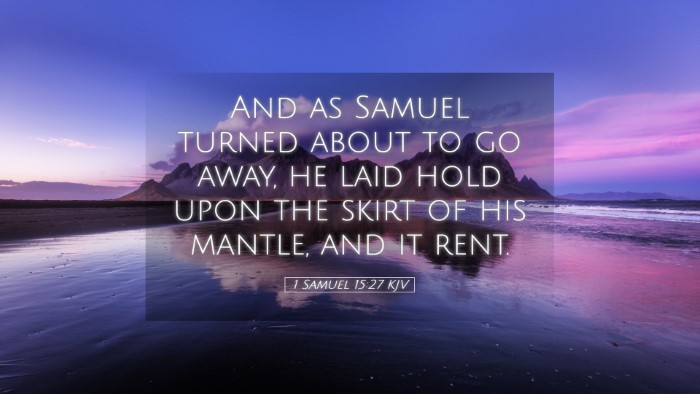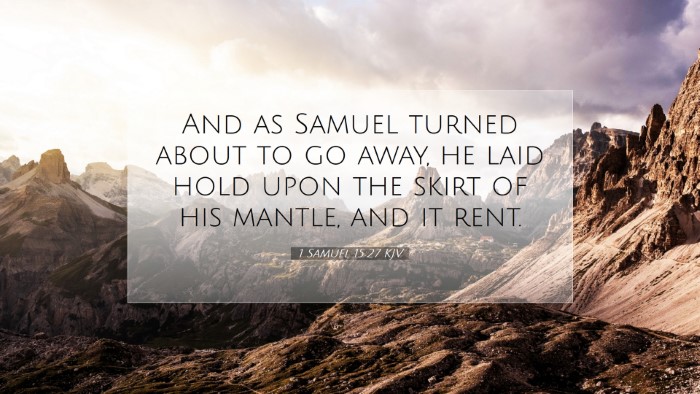Commentary on 1 Samuel 15:27
Verse Reference: 1 Samuel 15:27 - "And as Samuel turned about to go away, he laid hold upon the skirt of his mantle, and it rent."
Introduction
The text of 1 Samuel 15:27 captures a pivotal moment in the relationship between Saul, the first king of Israel, and the prophet Samuel. This verse succinctly illustrates the tension resulting from Saul's disobedience to God's command and marks a significant divide in their relationship. In this commentary, insights from Matthew Henry, Albert Barnes, and Adam Clarke will be synthesized to provide a deep understanding of the theological and practical implications of this verse.
Contextual Background
To fully appreciate the significance of this verse, it is crucial to understand the broader narrative of 1 Samuel 15. God had commanded Saul to destroy the Amalekites and all they possessed as a judgment for their sins against Israel. Instead of complete obedience, Saul spared King Agag and the best of the livestock, claiming they were to be used for sacrifices. This act of disobedience led to God's rejection of Saul as king, as conveyed through Samuel, marking a turning point in Israel's leadership.
Analysis of Key Terms and Actions
- Samuel's Turn: The act of Samuel turning away signifies a physical and symbolic departure from Saul. This turning is not simply a matter of body orientation but symbolizes the severance of divine favor and prophetic guidance from Saul.
- The Skirt of His Mantle: In ancient Israel, the mantle was a sign of authority and prophetic call. Saul's grasping of the skirt illustrates a desperate attempt to cling to a diminishing hope for mercy and continued favor. This act reveals Saul’s awareness of the gravity of his rejection.
- It Rent: The tearing of Samuel's robe serves as a poignant symbol of how God has torn the kingdom from Saul. This imagery serves to highlight the irreversible nature of Saul's sin and the loss of God's presence in his reign.
Theological Implications
Throughout the commentaries, a theological consistency emerges regarding the nature of obedience, authority, and divine judgment. The rent of the mantle is seen as an outward sign of an inward reality: God's irrevocable decision against Saul and the divine standards of leadership.
- Obedience Over Sacrifice: As highlighted by Henry, this passage emphasizes that God values obedience over ritualistic worship. Saul's misunderstanding of this aspect led to his downfall.
- Consequences of Leadership: Barnes reflects on the heavy burden of leadership, indicating that the rejection of Saul was both a personal loss and a national consequence, teaching future leaders about the seriousness of their responsibilities to God.
- Judgment and Mercy: Clarke points out the balance of God’s justice and mercy. While Saul faced divine judgment, there is an underlying thread of God’s desire for repentance and restoration, which Saul ultimately failed to grasp.
Practical Applications
The narrative surrounding this verse offers numerous lessons for modern-day spiritual leaders, scholars, and believers:
- Importance of Accountability: Leaders must be willing to accept correction and guidance from God and those He places in authority over them.
- The Nature of True Repentance: This passage highlights the necessity for genuine repentance and obedience to God’s will, surpassing mere acknowledgment of wrongdoing.
- Awareness of Consequences: The consequences of disobedience extend beyond the individual to affect the wider community, a principle that is still applicable in contemporary church and societal leadership.
Conclusion
1 Samuel 15:27 encapsulates a profound moment of failure, loss, and divine judgment. By studying the varying commentaries, we see layers of meaning intertwined with personal and communal significance. This moment serves as a biblical lesson on the importance of unwavering fidelity to God’s commandments and the serious repercussions that stem from straying from divine directives.


